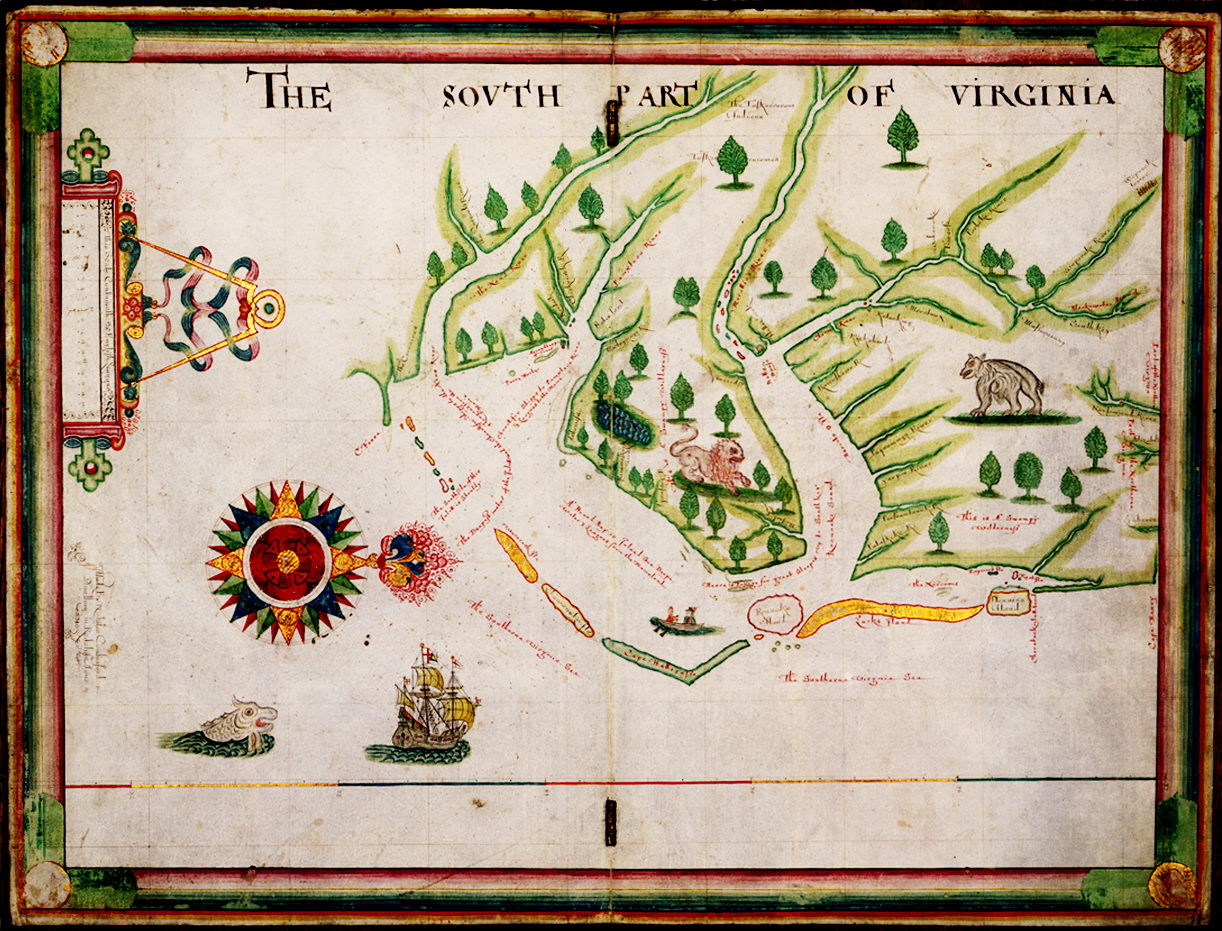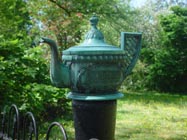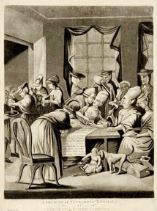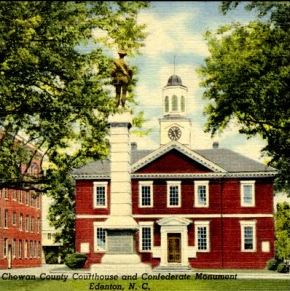The first permanent English settlement in North Carolina was made, it may be safely said, to the eastward of the Chowan River, extending in time down to and along the Albemarle Sound. Neither its date nor its locality may now be fixed with absolute certainty, but it began, doubtless, before 1660, and probably as early as 1650.
The grant to Roger Green, “clarke,” in 1653, to be located on the Roanoke River and the south or west side of the Chowan River, as a reward for inducing settlements to be made there, and the absence of such grants on the north or east side, indicate that settlements had progressed on that side without the aid of such inducements.

The first natives in the region were the Weapemeoc, and their central trading town, also called Weapemeoc, was located near the present site of Edenton. The Weapemeoc were a confederation of tribes (the Pasquotank, Perquimans, Poteskeet, and Yeopim) whose territory stretched across the southern edge of the Chesapeake Bay region to land north of the Albermarle Sound. Chief Okisco led the Weapemeoc, whose numbers had reached 1,500, during European settlement of the colonies in the 1600s. The Weapemeoc were eventually driven away by the surging amount of white settlers, and by 1679 only approximately 200 native Weapemeocs remained in present-day Edenton. Frequent battles with neighboring tribes, European diseases, and absorption into other cultures led to the demise of the Weapemeoc tribe.
Established in 1668 as the Shaftesbury Precinct of Albermarle County by incoming English settlers, the Chowan Precinct eventually formed in 1681, and it was named after the Chowan River. Both the river and the precinct were named in honor of the Chowanoac who lived in the area with the Weapemeoc before the mass of English settlers swarmed the area. The seat of government, Edenton (named in honor of Charles Eden, a royal governor of North Carolina), was originally known as the Town on Queen Anne’s Creek. It became known as Edenton after its incorporation in 1722. Edenton, a historic city linked to the colonial and revolutionary era, was the capital of the colony for over twenty years from 1722 to 1743, and it served as the site of the illustrious Edenton Tea Party.

On the heels of the Boston Tea Party protest on December 16, 1773, North Carolinians staged a similar protest in support of American independence. Fifty-one women met on October 25, 1774, in Edenton with an agenda not unlike that of the fifty men in Boston Harbor, their shared cause being a protest against “taxation without representation.” The women (or some among their number) gathered at the home of Mrs. Elizabeth King, a prominent member of the Edenton community. Penelope Barker, wife of Thomas Barker, treasurer of the Province of North Carolina is believed to have organized the party. The extent of the advance planning is not known. The home of Mrs. King was so small that all fifty-one women likely could not have assembled therein. The house, just off the courthouse green, was pulled down in 1876.
The women drew up resolves, declaring their intention to boycott English tea and English cloth. They stated, “We, the Ladys of Edenton, do hereby solemnly engage not to conform to the Pernicious custom of drinking tea,” and that “We, the aforesaid Ladys will not promote ye wear of any manufacturer from England until such time that all acts which tend to enslave our Native country shall be repealed.” The step was a momentous one for colonists, because drinking tea was an English tradition that defined social gatherings. To suspend the custom, a part of everyday life, showed just how disgusted they were with the English government. Like the Boston Tea Party, the Edenton Tea Party was a bold demonstration of patriotism and the belief in individual rights.

It was not long before caricatures and articles depicting the ladies as unruly were published in England. An account of the gathering at Mrs. King’s appeared in the Morning Chronicle and London Advertiser on January 16, 1775, along with a drawing portraying the women in a less than flattering light. The story of the Edenton Tea Party has endured over the years. A colonial teapot mounted on a Revolutionary era cannon commemorates the meeting just off the green in front of the 1767 Chowan County Courthouse. The local chapter of the Daughters of the American Revolution is named for the event.
The Chowan County Courthouse, the oldest courthouse in North Carolina, was constructed in the late 1760s. Joseph Hewes and Jacob Blount, both county assembly members, developed a plan to construct a new courthouse in Edenton in 1766. Throughout the Colonial and Revolutionary Era, the likes of Samuel Johnston, James Iredell, and other North Carolinian Patriots assembled in the Chowan County Courthouse to discuss independence from Great Britain. Although historians disagree over the building’s architect, the courthouse displays simplistic Georgian architecture: a vast rectangular outside frame of Flemish-bond brick, an English ballast stone floor, and whitewashed walls. The courthouse has gone through many renovations, and in October 2004, the site was opened for public use.

During the War Between the States, the Albemarle Artillery was recruited in 1862 from Chowan and Tyrrell men at Edenton by local attorney William Badham, Jr.. After cannon were recast from bronze donated as bells from local courthouses and churches to arm the battery, the unit was renamed the Edenton Bell Battery after their named guns, Columbia, St. Paul, Fannie Roulac, and Edenton. Two of the guns, long thought lost, have been returned to Edenton in recent years. The St. Paul and the Edenton now can be seen on display at Edenton’s waterfront park. Named for the Chowanoc Indian tribe.
Sources: The Colonial Records of North Carolina Vol. I By William Laurence Saunders, (1835-1891), published 1886; Wikipedia – Chowan County, NC; North Carolina History Project;